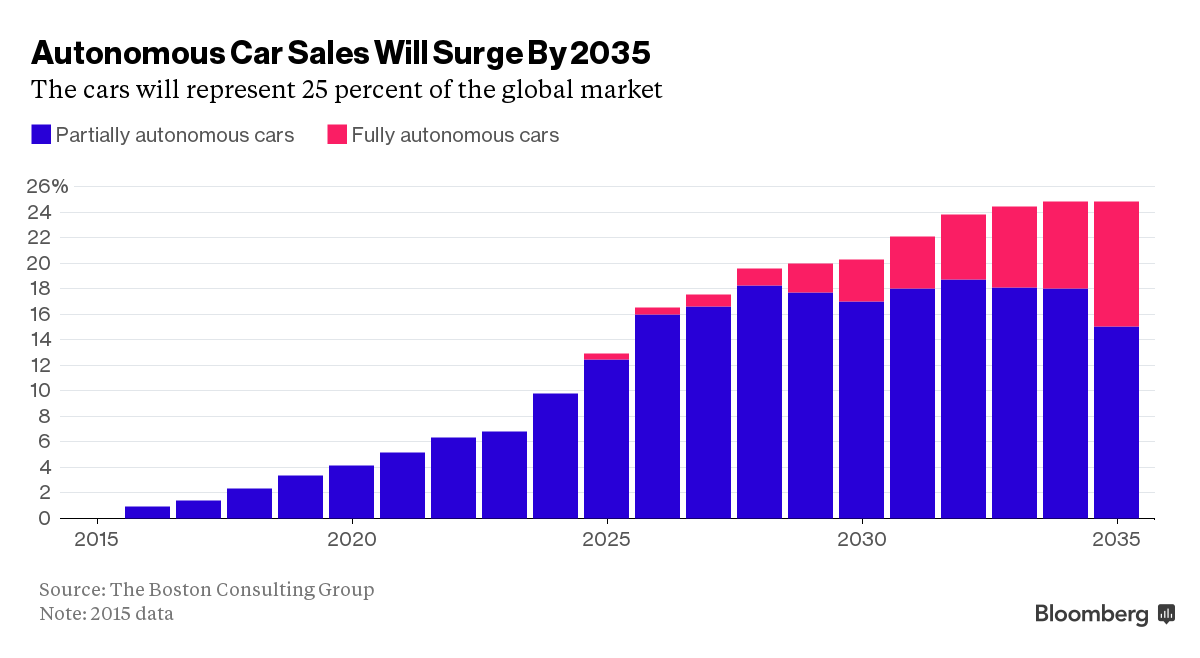The car industry is heading towards a driverless future

States such as Florida already permit autonomous vehicles.
Image: REUTERS/Alexandria Sage
Stay up to date:
Technological Transformation
Henrik Christensen, director of the University of California San Diego’s Contextual Robotics Institute, has issued a jarring prophecy for the next generation: “My own prediction is that kids born today will never get to drive a car.”
His forecast, which he shared in a December interview with The San Diego Union-Tribune, is rooted in signs that the auto industry is racing toward a driverless future. “Autonomous, driverless cars are 10, 15 years out,” he said. “All the automotive companies—Daimler, GM, Ford—are saying that within five years they will have autonomous, driverless cars on the road.”
But the prediction should provoke some skepticism. For one, it suggests most non-self driving cars will be off the roads within 15 years. That is, to say the least, improbable. The average age of a US vehicle is 11.5 years. With 258 million light vehicles on the road, and 17 million new ones sold each year, we’re unlikely to see fleet turnover for decades. Meanwhile, analysts expect only 21 million autonomous vehicles globally to reach the roads by 2035.

Despite the advent of kits to turn our manual jalopies into robot chauffeurs, the US is in no shape to handle hundreds of millions of autonomous vehicles on its lanes, streets, and highways anytime soon. The US Department of Transportation issued guidelines in November to help ease the transition, but uncertainty abounds. States such as Florida already permit autonomous vehicles, and more will surely follow, but autonomous driving technology that qualifies under those statutes, not to mention a national legal framework, is still years if not decades away.
On Jan. 5, Gill Pratt, head of the Toyota Research Institute, said at the Consumer Electronics Show in Las Vegas that “none of us in the automobile or IT industries are close to achieving true Level 5 [i.e. full] autonomy. We are not even close.”
What’s more likely is that some children born today, in some places, will never need to drive a car. That’s already true in places like Manhattan, where public transport options have long made it feasible to live car-free, and where a bevy of new car services makes ditching private automobile ownership even easier. (Only 23% of Manhattanites owned a car in 2013, compared to 92% nationwide.) This reality could spread to other urban areas where lower density and costly infrastructure make car ownership more prohibitive.
Autonomous vehicles, complemented by car services such as Lyft and Uber, could make it preferable and more affordable to ride with robots rather than get a driver’s license. This trend is already emerging in places such as Beverly Hills, California, which is preparing its own public transit plans involving autonomous vehicle fleets.
But remember: Tractors and automobiles took nearly 50 years to replace the horse on farms and across delivery systems in North America. Technology moves a lot faster today, but human beings’ habits may not.
Don't miss any update on this topic
Create a free account and access your personalized content collection with our latest publications and analyses.
License and Republishing
World Economic Forum articles may be republished in accordance with the Creative Commons Attribution-NonCommercial-NoDerivatives 4.0 International Public License, and in accordance with our Terms of Use.
The views expressed in this article are those of the author alone and not the World Economic Forum.
Forum Stories newsletter
Bringing you weekly curated insights and analysis on the global issues that matter.